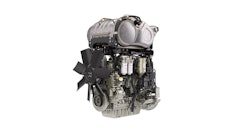January 2012 marks the official implementation date for tougher heavy-duty diesel emissions legislation in China. According to the country’s Ministry of Environmental Protection (MEP) the emission standard China IV (equivalent to Euro IV) should be applied to all heavy-duty diesel vehicles from this month onwards. However, it seems that the deadline will be delayed again.
This is not the first time that Chinese emissions legislation has been delayed. China III (equivalent to Euro III) was implemented in January 2008, applying to all heavy-duty trucks. The next step, China IV, was supposed to follow in January 2010 for new vehicle types and one year later in January 2011 for all vehicles. By last January it became clear that the legislation had to be delayed. In a response to a request by China’s Association of Automobile Manufacturers (CAAM), the MEP consequently announced a delay of one year and set the new implementation date for January 2012. Now it seems likely that a further delay will occur.
Delays in the implementation of emissions legislation are not unique to China. The other three BRIC countries Brazil, Russia and India have all seen similar delays. The reason for the delay in each case is a recurring theme: the lack of low sulphur fuel. The successful implementation of advanced diesel aftertreatment technologies relies on the availability of low sulphur diesel.
China is no exception in this matter. It was originally agreed that 350 ppm sulphur diesel should be made available nationwide in 2010. However, implementation of low sulphur fuel was delayed until summer 2011. Six months later 350ppm is still not available nationwide.
The problem is usually not of a technical nature. Chinese refining companies are currently able to produce low sulphur fuel. Some refineries are already producing diesel with 50 ppm of sulphur for cities such as Beijing. The main issue lies with the costs associated to the upgrade of diesel refineries and the distribution of this type of diesel. Diesel prices in China are still regulated by the state. Introducing 350 ppm nationwide would require a substantial increase in diesel prices or similar financial incentives to match the costs to the manufacturers.
In a communication of the Chinese State Council published in October last year a preferential tax treatment for companies producing low sulphur fuel was suggested. Such measures could provide an incentive to the major fuel companies such as Sinopec and CNPC to produce and market lower sulphur diesel.
The question now remains as to when such measures will come into force and 350 ppm diesel will ultimately become available nationwide. The Chinese government has not set a new target. The new implementation date of China IV remains therefore unclear. It seems unlikely that the implementation will take place before the second half of 2012 and it might even be delayed until January 2013.



























